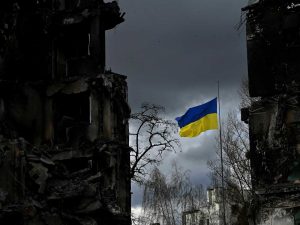
TOPSHOT – The Ukrainian flag flutters between buildings destroyed in bombardment, in the Ukrainian town of Borodianka, in the Kyiv region on April 17, 2022. – Russia invaded Ukraine on February 24, 2022. (Photo by Sergei SUPINSKY / AFP) (Photo by SERGEI SUPINSKY/AFP via Getty Images)
The Russia-Ukraine war enters into its first year on Friday with no indication that it will end anytime soon, and with key players on the political chessboard continuing to flex their muscles, deploying sophisticated weaponry and sending more troops to the battlefield.Since Russia launched ‘a special military operation’ on Ukraine on Feb 24, the wider world was also severely impacted one way or another.
The global economic and geopolitical order were fundamentally altered, with disruptions to supply chains including food and grains, apart from an acute energy crisis in Europe after Russia cut off its gas supply in response to the economic sanctions the West slapped on it. It also sparked another humanitarian crisis, with the United Nations data showing that more than 8 million people had fled Ukraine to date, while some 5.9 million Ukrainians were internally displaced and over 17.6 million more in need of humanitarian assistance.
Founder and Managing Director of Crisis Management Centre Nordin Abdullah said judging from the recent developing events from both sides, the war would take “several years” to end. He stressed that the war that happened now is a culmination of deep-rooted conflicts between both states in Crimea since almost a decade ago.
“This war will last until the military and political objectives of one side are met and the other side can no longer continue. If the strategic imperatives remain the same, and looking at the previous years of armed conflict in the country, there is still going to be several years of fighting. “My concern is that we don’t understand all of the objectives of each and every player in this game. It is a war of attrition and both sides have access to considerable men and material, have the resolve to fight, and currently have no motivation for compromise,” he told Bernama.
Recent escalations in terms of volume and sophistication of military hardware thrown into the breach only showed that his trend will only continue as the stakes for each side continue to get higher. “Everything we see on the battlefield involves global supply chains. The media war has reached every television station, news portal and social media platform. “Even the manipulation of the algorithms is a contested arena. The use of cyber attacks on direct targets and related supply chains are, by many accounts, unmatched in history.
“The use of every tool in the cognitive warfare toolkit, not to mention a myriad of grey zone tactics, makes this war a new benchmark in modern warfare,” he said. According to the latest reports, the United States is the largest provider of military assistance to Ukraine, with total contribution since the beginning of the war now standing at US$29.8 billion. The United Kingdom is the second largest contributor with £2.3 billion (US$2.8 billion), while the European Union (EU) has committed €3.6 billion (US$3.8 billion).
Addressing the Russian parliament — the Federal Assembly — on Tuesday, Putin said that the more long-range weapons the West supplies to Ukraine, the further Russia will have to move the threat away from its borders. Commenting further, Nordin noted that at this stage, peace talks will only be possible for both sides after meeting their military objectives. “Meaningful peace talks will not be easy without a sustainable ceasefire. We must not forget the human side of this conflict, real people on both sides are being scared, maimed and killed, (and) families are losing loved ones.
“We, as the rest of the world, must help through whatever means possible to bring this conflict to an end and build a positive sustainable peace,” he said. Meanwhile, principal adviser at Pacific Research Centre of Malaysia Dr Oh Ei Sun noted that there were sporadic indications of willingness to end the conflict. “But ultimately, it depends on whether the leaders involved have the political will to end the war early,” the senior fellow of the Singapore Institute of International Affairs added.
Oh pointed out that Russia’s struggle to defeat Ukraine was due to the support of the West, reminiscent of the 1980s when Soviet-occupied Afghanistan continued to have a defiant Mujahideen, which eventually led to the departure of Soviet troops. “Russia is now essentially engaged in a proxy war with the West,” he said. Dialogues for peace was stalled indefinitely, with both Russia and Ukraine having had their unwillingness to return to the negotiation table for now made known after accusing each other of setting preconditions for the talks.
In January, Kremlin Spokesman Dmitry Peskov said there was currently no prospect for peace talks with Ukraine, while the Ukrainian side reportedly closed the doors for any meet until it regain control of some of its territories. According to international reports, it is estimated that about 200,000 Russian troops were affected while Ukraine has some one million killed or wounded in action – with 30,000 civilian deaths – since the war broke.
— BERNAMA
Nordin Abdullah is the Founding Chairman of Malaysia Global Business Forum.

